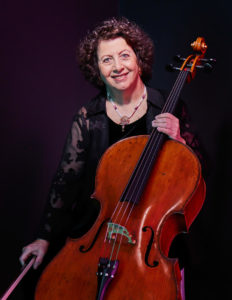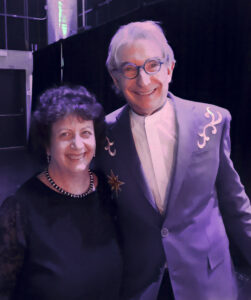
Barbara Bogatin
Photo credit: SF Symphony
In January 1974, a vibrant, 30-year-old conductor stepped onto the podium at the War Memorial Opera House and conducted the San Francisco Symphony (SFS) in a knockout performance of the Ninth Symphony by Gustav Mahler. On January 27, 2024, fifty years seemed to have passed in the blink of an eye as Michael Tilson Thomas again stood before the SFS, and with bittersweet gratitude evident in every well-honed gesture, conducted the same composer’s Fifth Symphony in the final subscription concert of his long tenure with “his” orchestra. The aggressive brain cancer that was diagnosed in 2021 was no impediment to the depth of care and love that MTT imbued in each phrase of Mahler’s monumental masterpiece.
Although I was hired by Herbert Blomstedt in his final year as Music Director, MTT granted my tenure in the cello section shortly after he arrived in 1995. How lucky I was to be given a front row seat to the entirety of his wild and crazy ride with us. During the 25 years he was Music Director, MTT forged a partnership with the Orchestra inspired by his eclectic musical creativity, innovative ideas, and a deeply rooted commitment to education for the world community.
Early on, MTT championed the works of underappreciated American composers, unapologetically introducing an unsuspecting audience (and orchestra!) to mavericks like Lou Harrison, Terry Riley, Carl Ruggles, Henry Brant, Edgard Varèse, and John Cage. Our American Mavericks Festival tour of 2012 was an unparalleled success, as it was hailed by Amanda Keil in bachtrack.com as “one of the most memorable, intelligently programmed, and brilliantly played concerts of the season.” In bringing the eccentric theater piece Song Books by John Cage on this tour, MTT gave what was surely the debut performance of an electric blender on the stage of Carnegie Hall.
MTT masterminded a television series for PBS called Keeping Score, a series of historical musical investigations of masterworks from Beethoven’s Eroica Symphony to Stravinsky’s Rite of Spring, with a two-part episode dedicated to the life and works of Gustav Mahler. In these productions, MTT traveled the world to uncover each composer’s origins and influences, shining an entertaining and insightful light on the mysteries of their creative process rarely revealed to those outside the music profession. He took concepts initiated by Leonard Bernstein’s legendary Young People’s Concerts and combined them with state-of-the-art audio and video technology to yield new dimensions of musical exploration.
Another of his visionary innovations, our SoundBox multimedia, multi-stage, curated concerts are performed in a renovated rehearsal space converted into a nightclub venue. An intimate acoustic environment is created with the aid of the Meyer Sound Constellation audio system. Each presentation welcomes new and younger audiences to Davies Symphony Hall and continues to expand the demographic for symphonic music in San Francisco.
But it was the music of Mahler that has always been the connective tissue between MTT and us musicians. His approach is both unique and very personal. The first time I played Mahler’s Fifth Symphony with MTT many years ago, he announced at the outset, “This interpretation will be different from what you’re used to…think of the music as originating from much further East…” Mahler was raised in a small, insular Jewish community in Bohemia, and MTT mined influences of this cultural heritage in the music’s emotional shape-shifting from old-world village charm to kvetching or anguished longing in a single melody. He harnessed the theatrical lineage from his grandparents, Yiddish theater stars Bessie and Boris Thomashefsky, to bring the music’s dramatic gestures and colorful characters to life.

Barbara Bogatin with Michael Tilson Thomas at a concert celebrating his 70th birthday in 2014.
Photo Credit: Barbara Bogatin
As the MTT-Mahler partnership grew, the SFS embarked upon a recording project that became a compendium of all of Mahler’s orchestral works, garnering seven Grammy awards. In 2011, the composer’s centennial year, we were invited to perform three of his symphonies at the prestigious Musikverein Concert Hall in Vienna, the only American orchestra so honored. This remarkable recognition of our formidable Mahler interpretations was an acknowledgement of the depth of understanding that had grown between a modern California orchestra and its quintessentially American conductor.
As our final week together drew to a close in January, I was moved to revisit the Keeping Score episodes “Origins” and “Legacy” about Gustav Mahler. In one video, MTT talks about the emotional power of this music and poignantly asks, “Why do we cry when we hear something beautiful? It’s because we fear it’s too beautiful, too beautiful to last. This is an essential quality of Mahler’s music, remembering that sense of beauty and wonder, the wonder that in spite of life’s bitterness and sorrow, we must always hold on to…Mahler teaches us to cherish the wonder of each moment.”
Through his dedication to this music, MTT reminds us of that truth.





